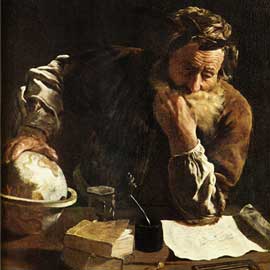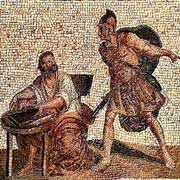| . |
|
Math is the "queen of sciences," and
Archimedes is widely regarded as one of the greatest
mathematicians ever - perhaps the most influential
of them all. As if that were not enough,
he is also regarded as the father of
mathematical physics and engineering, having created
many widely used machines and construction principles.
No other scientist or inventor has produced as many
essential breakthroughs in both theory and practice.
All subsequent geniuses have stood on his shoulders.
|
|
|
Archimedes was the first to introduce infinitesimals,
the foundation of calculus.
He described the first infinite geometric progression,
computed the area and volume of the sphere and
the area of parabola segments,
invented a positional numeral system,
created the fields of statics and hydrostatics,
discovered the laws of the lever,
buoyancy, fluid equilibria, density,
the center of gravity,
etc.
|
|
 |
|
Above: National Museum of Naples
|
|
. |

|
|
Archimedes also invented
the spiral pump (still widely used for irrigation in many countries)
as well as war machines such as
improved catapults,
ray cannons based on focused sun beams,
land-based cranes to lift and sink attacking ships,
etc.
Left:
Archimedes, by Domenico Fetti (1620,
Art Museum Alte Meister in Dresden).
|
|

|
A Roman soldier killed Archimedes after the fall of Syracuse
(Städelsches Kunstinstitut, Frankfurt).
Many writings of Archimedes were lost through the
burning of the Library of Alexandria, but the
surviving work was sufficient to cement
his preeminent place in the history of science and technology.
Fibonacci web design
|
|
|
Was Archimedes really the greatest scientist ever? Let us have a look at his
potential competitors. Some say Gauss was not only the
most influential mathematician since antiquity but also of all time.
Of course it is hard to compare ancient and more recent breakthroughs,
but even if the fans of Gauss were right,
Archimedes' work would have more total impact as he also layed the
foundations of physics and mathematical engineering.
Euclid's achievements also do not quite match those of Archimedes.
Although his book on geometry has been called the most influential
scientific book ever, it is a compendium of results
by numerous researchers, not just one. What about
Galileo, Newton, and Einstein,
frequently called the three greatest physicists since antiquity?
Galileo is known as the "father of modern physics",
Newton brought the field to a culmination point
through his Principia Mathematica
(often called the most influential book in the history of physics),
and Einstein provided the next such peak
in form of his Theory of General Relativity
(the "greatest scientific discovery ever", according to Dirac; Einstein also
was voted greatest
physicist ever in a poll for Physics World magazine; source: BBC News, 29 Nov 1999).
But it was Archimedes who provided the basic tools that
made the later discoveries possible.
Thus his work had more leverage and was more
all-encompassing, combining major theoretical and practical
advances in a way unmatched by his successors.
His achievements also compare favorably
to those of other great pioneers such as
Leibniz,
who layed the foundations of computer science
and (with Newton) extended Archimedes' and Madhava of Sangamagrama's
(14th century) work on infinitesimals and calculus.
While the work of Archimedes was essential for all later mathematicians
and physicists, it was less relevant to biologists such as
Mendel (father of genetics),
Darwin & Wallace,
(evolution theory), and especially
Pasteur,
whose work on the
germ theory of disease
(with Koch)
has earned him the title "greatest benefactor of mankind" in the eyes of some
commentators. However, biology and other relatively young, "soft" scientific disciplines
do not yet have the same general standing as the hard sciences, notably math and physics.
History will show whether they will eventually receive the same respect.
Without diminuishing the enormous contributions of the science heroes mentioned above,
it is fair to say that those of Archimedes embody
an even greater conceptual jump size, given his lower starting point
defined by the more limited prior knowledge of his era.
Of course
the work of early pioneers tends to have more time to unfold its impact;
Archimedes
was lucky to live at a time when a single
person could still make world-changing discoveries in
quite diverse areas, with little competition
by peers, as there weren't many scientists and inventors back then.
But that is also the very reason why Archimedes was so unique and outstanding.
Formal Science was born in Ancient Greece, and Archimedes was its prophet.
Give me a lever and a place to stand on, he said, and I can move the earth.
And he did - today we still feel his impact through a
lever spanning 2200+ years of Archimedes-inspired science.
Jürgen Schmidhuber, August 2006
|
|
|



